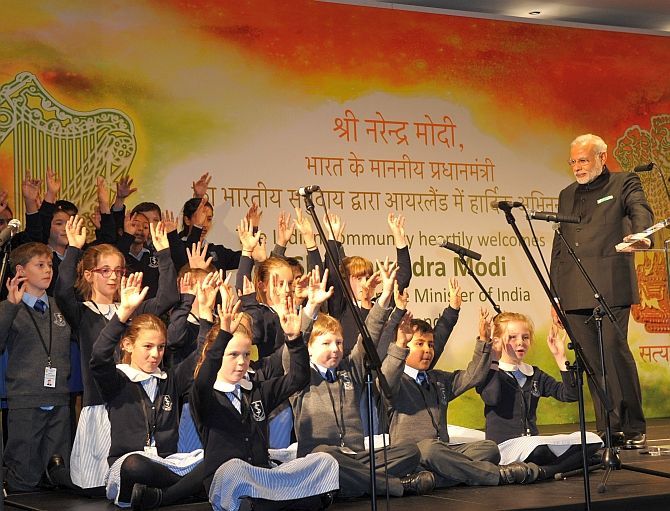'The test of true secularism in India is when a girl in your family decides to marry someone from another religion. If you accept her decision happily, then you are truly secular. If you don't, it means your secularism is fake,' argues Syed Firdaus Ashraf.

When Prime Minister Narendra Modi took a dig at secular Indians after a recitation of Sanskrit shlokas in Ireland last week, I questioned my own belief about what secularism meant.
This question first came to my mind as a teenager after I witnessed an intense discussion in my family when a cousin was about to marry a Hindu.
I had just returned from a game of cricket that evening and had no idea what provoked the tension in our joint family. I didn't dare ask questions at that time, but I knew something was amiss.
The next day I discovered what the heated debate was about and I wondered what was wrong if my cousin sister decided to marry a Hindu.
This was the first time that someone from my family was marrying a Hindu. Many family members didn't know what to say or do. Some kept mum, some were vociferous against her decision while others were ready to welcome the match. My cousin did marry the Hindu and the fuss that preceded the wedding was a huge learning experience for me.
The test of true secularism in India is, I believe, when a girl in your family decides to marry someone from another religion. If you accept her decision happily, then you are truly secular. If you don't, it means your secularism is fake.
I learnt more about secularism after I became a journalist. After Partition in 1947 I learnt there was a huge trust deficit between the Hindus and Muslims. Hindus did not eat at Muslim homes and vice versa.
'Any person who is ready to share his roti or beti(daughter) in marriage with a person of a different religion is secular,' so went a saying at that time. 'If not, he is communal.'
In the 68 years since Independence, the now much reviled Congress party made it possible that if not 'beti,' at least we can share our rotis together in India.
The iftaar parties during Ramzaan is a good example of this though many would dub it fake secularism. I believe the ritual gives Muslims a sense of belonging that political leaders are ready to share a meal -- which, incidentally, the current prime minister has steadfastly refused to do.
Prime Minister Modi has attended events hosted by Christians, Jains and Parsis, but refuses to attend any Muslim event.
The leader who gave the word 'secularism' a completely new twist was Lal Kishenchand Advani when he led the Bharatiya Janata Party.
Advani rephrased the word secular as 'pseudo-secular', and so successful was he that that phrase was invoked whenever the Congress spoke of secularism.
In Ireland last week, after Irish school children recited shlokas, Modi quickly pointed out, 'It's a matter of happiness that we can do it in Ireland. Had it been done in India, then questions would have been raised on secularism.'
On his visit to Japan last year, while presenting the Bhagvad Gita to Emperor Akihito, Modi poked fun at the secularists, saying, 'Our secular friends will create a 'toofan' (storm) that what does Modi think of himself? He has taken a Gita with him, that means he has made this communal.'
The fact is no one objected to Modi presenting the Gita to the Japanese emperor, but the prime minister seemed determined to use the opportunity to defame secularists.
It is shameful that the prime minister of India mocks secularism, and that too overseas.
During the 2014 election campaign, I asked Shia religious leader Maulana Kalbe Jawad Naqvi if he felt secularism would die in India if Modi became prime minister.
"It is not possible," the maulana told me. "The secular character of India can never be finished. India is secular by nature. Whoever comes to power, he will have to become secular to rule."
"One should never have so much enmity with anyone that there is no possibility of reconciliation," he added in the interview.
By deriding the concept of secularism -- in India as well as overseas -- the prime minister has gone too far. I feel there can be no possibility of a reconciliation with Modi on this issue.
So let us change the word 'secularism' to 'sickulars' -- as Modi bhakts dub anyone who opposes their rant -- till 2019, shall we?
IMAGE: Irish children recite shlokas at an Indian community reception in Dublin, September 23. Photograph: Press Information Bureau











 © 2025
© 2025